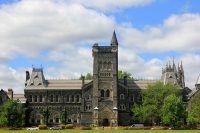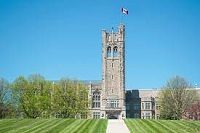Choosing the right MBA college in Canada can be overwhelming. There are so many options, different fee structures, and mixed advice online that it’s hard to know where to start. To make this decision easier for you, we’ve curated a list of the best MBA colleges in Canada for 2026, carefully selected from the trusted QS World University Rankings for MBA in Canada. Our picks are based on what truly matters to students: tuition affordability, job placement rates, student satisfaction, multiple intakes, global recognition, timely graduation rates, and competitive starting salaries.
top mba UNIVERSITIES in canada
-
PictureUniversity NameMBA SpecializationUniversity Details
-
 Energy Finance
Energy Finance
Entrepreneurship & Innovation
Strategy & ConsultingPublic
Full-time / Part-time
Duration:20 months
Avg fees:CAD 70,000
QS Canada: 7 -
 Finance
Finance
Consulting
Brand ManagementPublic
Full-time / Part-time / Executive
Duration:20 months
Avg Fees: CAD 103,000–139,000
QS Canada: 1 -
 Finance
Finance
Marketing
Business AnalyticsPublic
Full-time / Part-time
Duration: 12–20 months
Avg Fees: CAD 99,500
QS Canada 2 -
 Strategy
Strategy
Finance
EntrepreneurshipPublic
Full-time/ Executive
Duration:12 months
Avg Fees: CAD 132,994
QS Canada 3 -
 Consulting
Consulting
Digital Transformation
FinancePublic
Full-time / Part-time / Executive
Duration: 12 months
Avg Fees: CAD 110,000
QS Canada 4 -
 Entrepreneurship & Innovation
Entrepreneurship & Innovation
Finance
Business AnalyticsPublic
Full-time / Part-time
Duration: 16 months
Avg Fees: CAD 94,559
QS Canada: 5 -
 Finance
Finance
Business Analytics
MarketingPublic
Full-time / Part-time / Executive
Duration: 20 months
Avg Fees: CAD 117,850
QS Canada: 6
Also read: Best 1 year MBA Universities in Canada.
Types of MBA & fee structure
Let’s understand the different types of MBA course offered in Canada and their respective fee structures. We’ll also look into the average salary range after each.
| Type of MBA Program | Duration | Approx. Fees (CAD) | Career Prospects | Approx. Salary Range (CAD) |
|---|---|---|---|---|
| Online MBA | 1 to 2 years | 20,000 to 40,000 | Diverse, including business analytics, supply chain management, healthcare management, hotel management, information technology management, digital marketing management, hospital management | 70,000 to 110,000 per year |
| Executive MBA | 1 to 2 years | 40,000 to 60,000 | Enhanced leadership skills, practical applications of business theory, often for experienced professionals | 100,000 to 150,000 per year |
| Full-Time MBA | 1 to 2 years | 30,000 to 50,000 | Immersive study with classroom learning, group projects, and practical experience | 80,000 to 120,000 per year |
| Accelerated MBA | 8 to 16 months | 40,000 to 70,000 | Intense, compressed curriculum, often in cohort format | 80,000 to 140,000 per year |
| Part-Time MBA | 2 to 4 years | 25,000 to 45,000 | Designed for working professionals, accommodates work schedules with evening or weekend classes | 75,000 to 120,000 per year |
Find out the Top- paying MBA Specializations in Canada.
Requirements for mBA in canada
Getting into a top MBA program in Canada requires meeting certain eligibility criteria. While each university may have its own guidelines, most ask for a bachelor’s degree from a recognized institution, competitive GMAT/GRE scores, English language proficiency (IELTS/TOEFL), and relevant work experience—often 2 to 5 years. Some schools may also require letters of recommendation and a statement of purpose.
If you want a complete breakdown with documents, score requirements, and university-specific criteria, read our detailed guide on MBA requirements in Canada.
If you don’t want to take the hassle of GMAT, here is a list of MBA universities without GMAT scores in Canada, to get admissions.
MBA in Canada cost and Scholarship Opportunities
Studying an MBA in Canada can be a life-changing decision, but one of the first questions every student asks is: How much will it cost? The answer depends on the university, program duration, and your lifestyle, but here’s a clear breakdown.
- Tuition Fees: Top-ranked MBA programs in Canada generally range from CAD 30,000 to CAD 100,000 for the full program. For example, programs at Rotman (University of Toronto) and Ivey (Western University) tend to be at the higher end, while schools like Concordia or HEC Montréal are more budget-friendly. The exact fee also varies depending on whether you are an international student or a domestic student.
- Living Expenses: On average, students spend CAD 15,000–25,000 per year on accommodation, food, transportation, and other personal expenses. You can manage costs better by choosing shared housing or budgeting for essentials. Check out our article on Living Expenses in Canada for a detailed guide.
- Scholarships and Financial Aid: Canada offers a variety of scholarships and funding opportunities for MBA students—both merit-based and need-based. Top universities often provide partial to full tuition scholarships, while external organizations also support international students. To explore all your options and eligibility criteria, read our dedicated guide on Scholarships in Canada.
- Other Cost-Saving Tips:
- Apply early to maximize scholarship chances.
- Consider programs with multiple intakes; sometimes off-peak intakes have lower tuition or more funding opportunities.
- Keep track of exchange rates and bank transfer fees if you’re funding from abroad.
- Bottom Line:
- While studying an MBA in Canada requires a significant investment, proper planning, and scholarships can make it affordable. By understanding the costs and exploring funding opportunities, you can confidently choose a program that fits both your career goals and budget.
Why Study MBA in Canada
Here’s why you should study at one of the top-ranked MBA Universities in Canada:
- Global Recognition & Rankings– Top Canadian universities consistently rank in the QS Global MBA Top 100, giving your degree strong global credibility and making it easier to land jobs in Canada and abroad.
- High ROI & Competitive Salaries– According to QS MBA Rankings 2025, graduates from leading Canadian business schools earn an average post-MBA salary of CAD $90,000–$120,000, with top performers crossing CAD $150,000, ensuring a strong return on investment.
- Post-Study Work Opportunities– Canada offers up to a 3-year Post-Graduation Work Permit (PGWP) for MBA graduates from eligible institutions, giving you enough time to gain Canadian work experience and potentially apply for permanent residency.
- Diverse & Industry-Connected Learning– Top-ranked business schools maintain strong corporate ties—Rotman partners with over 1,000 companies for internships and placements, ensuring hands-on learning, networking, and job opportunities in industries like finance, consulting, and tech.
- Supportive Environment for International Students– Canada ranks among the top 10 safest countries (Global Peace Index 2024) and is known for its multicultural campuses, making it easier for international students to adapt, network, and thrive academically and professionally.
Frequently Asked Questions
Yes, there are. If you’re looking for cheaper options, you may fill the form below so that we can help you further with admission guidance.
You may discover the career prospects and competitive salaries after MBA in Canada.
A. You may also find a timeline for applying for MBA universities in Canada here. This will help you to understand how many months prior you should begin the process.
